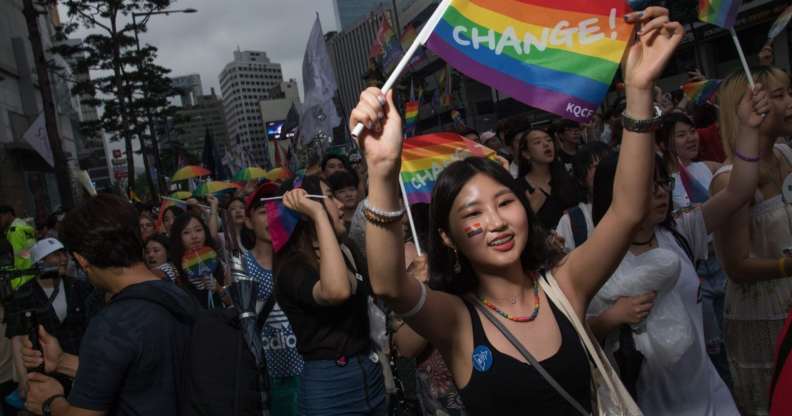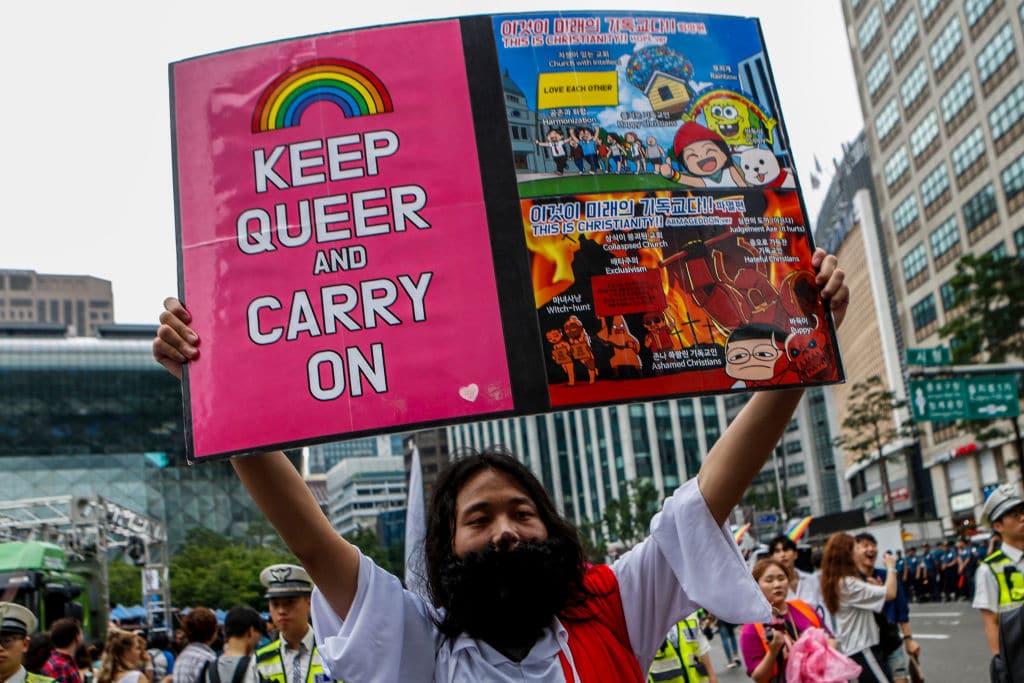South Korean court rejects gay couple’s bid for equal healthcare benefits: ‘Love will eventually win’

Pride in Seoul, South Korea. (ED JONES/AFP/Getty Images)
One of South Korea’s top courts dismissed a landmark lawsuit that sought to bolster LGBT+ rights by enshrining equal access to healthcare benefits.
The Seoul Administrative Court on Friday (7 January) shrugged off the suit brought forward by So Seong-wook, 30, against the country’s National Health Insurance Service (NHIS).
Filed last year, the service withdrew Seong-wook’s ability to receive spousal benefits under the employer of his partner, Kim Yong-min.
Yong-min had initially been able to register his partner in early 2020 as an independent, which activists say might have been the first example of this in the country.
But months later, the National Health Insurance Service yanked the coverage away following media coverage, United Press International reported.
Gay couple vow to ‘continue fighting’ after South Korea court rejects lawsuit
In a judgement that captures the frustration felt by countless queer South Koreans, the court passed on an opportunity to bolster the rights of LGBT+ people.
It said that it had no legal basis to change the definition of marriage – a move needed to restore the couple’s coverage.
“The union of a man and woman is still considered the fundamental element of marriage, according to civil law, precedents of the Supreme Court and the Constitutional Court and the general perception of society,” the judgment read.
While they aren’t legally married, given that marriage equality is not recognised in South Korea, the plaintiffs had argued in the courts that the NHIS often recognises non-married citizens as common-law spouses.
The court, however, disagreed. “Under the current legal system, it is difficult to evaluate the relationship between two people of the same-sex as a common-law relationship,” the judgement added.

LGBT Group members performance with marching parade during an LGBT rally near square in Seoul, South Korea, on 16 July 2017. (Photo by Seung-il Ryu/NurPhoto via Getty Images)
“Even though the court has left it as a matter of the legislative branch, we will continue to fight until the day our relationship is recognised, Yong-min told reporters, adding that he plans to appeal.
“I believe that love will eventually win.”
As much as LGBT+ South Koreans have made gains in recent years, their growing visibility has touched off opposition from powerful conservative Christian groups, often scuttling proposed pro-LGBT+ laws in the process.
South Korea does not ban homosexuality, but their rights are relatively threadbare.
There are little to no discrimination protections nor recognition of same-sex relationships, razor-thin adoption rights and no ban on conversion therapy.
The nation’s sluggishness in uplifting LGBT+ rights has taken a deep toll on young queer people, activists warned last year.
“Even as domestic public opinion warms to LGBT rights and neighbouring governments take steps toward LGBT equality, however, South Korea’s government has failed to make meaningful progress, citing intense religious and conservative opposition to justify inaction,” Human Rights Watch wrote in a report.
“Korea is falling behind regarding other LGBTI-inclusive laws such as legal provisions explicitly protecting LGBTI individuals against discrimination and violence, or laws addressing the unique challenges faced by same-sex couples.”

